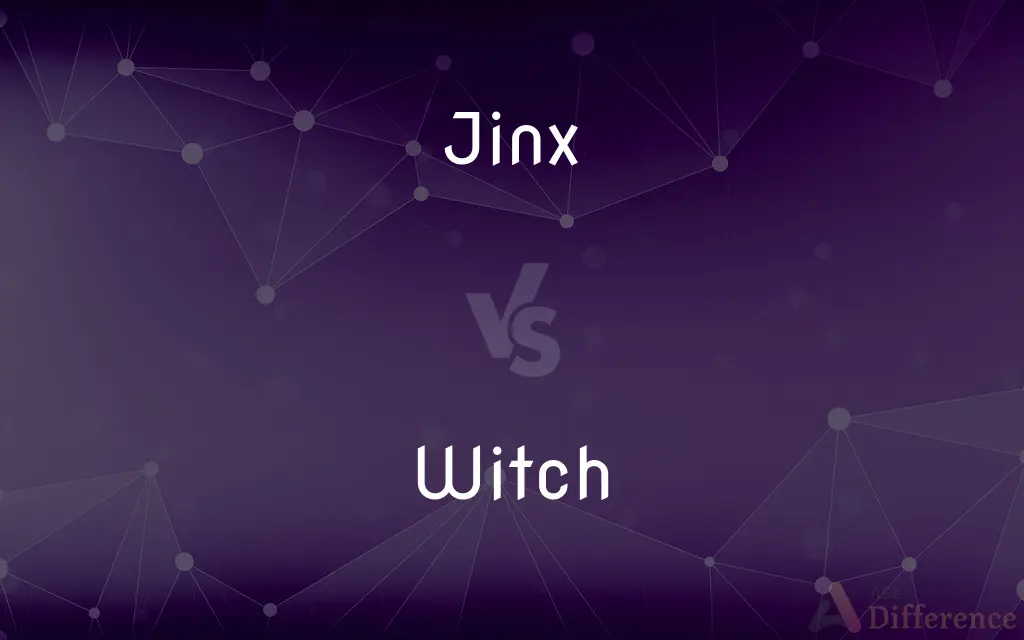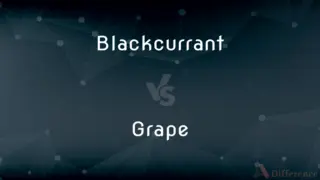Jinx vs. Witch — What's the Difference?
Edited by Tayyaba Rehman — By Fiza Rafique — Updated on April 19, 2024
A jinx refers to a superstition involving bad luck or a curse brought on by a person or an event, while a witch is a person, typically a woman, believed to practice magic or sorcery.

Difference Between Jinx and Witch
Table of Contents
ADVERTISEMENT
Key Differences
A jinx is typically associated with bad luck or minor misfortunes that are often temporary and linked to specific situations or objects. In contrast, a witch is someone believed to possess and practice supernatural powers, often through spells or rituals.
The concept of a jinx is often used colloquially to describe a situation where things go wrong repeatedly in an almost inexplicable way. Meanwhile, witches are portrayed in folklore, literature, and modern media as individuals with the ability to influence people, events, and natural forces, frequently using this power to enact broader changes or fulfill personal goals.
Jinxes can be accidental or unintentional, such as when someone mentions a good situation, and suddenly it turns sour—the infamous “you jinxed it” scenario. Witches, however, are usually depicted as deliberately using their knowledge and powers, whether for good, evil, or personal motives.
The remedy or response to a jinx might involve simple superstitious acts or sayings to "undo" the bad luck, such as knocking on wood. In the case of a witch, the historical and cultural responses have been vastly more severe and complex, ranging from societal exclusion to persecution.
While jinxes are generally seen as light-hearted or superstitious elements within cultural contexts, the concept of a witch has profound historical roots with significant social, cultural, and moral implications, often reflecting societal attitudes towards mysticism, power, and gender.
ADVERTISEMENT
Comparison Chart
Definition
A superstition causing bad luck or a curse
A person believed to practice magic
Nature
Temporary, specific
Long-term, general
Intentionality
Often accidental
Deliberate use of powers
Remedies
Superstitious acts, sayings
Complex societal or cultural responses
Cultural perception
Light-hearted, minor
Serious, often negative historical implications
Compare with Definitions
Jinx
A person or thing that brings bad luck.
He’s a jinx; every project he joins fails.
Witch
A person, especially a woman, who practices witchcraft.
The village often consulted the witch for healing potions.
Jinx
A situation or an action that results in a curse or bad luck.
Mentioning the no-hitter was a jinx; the pitcher lost it immediately after.
Witch
Someone regarded as cunning or enchanting.
Her grandmother was known as the witch of the family for her herbal remedies.
Jinx
A spell or curse that brings misfortune.
She felt like there was a jinx on her house after the series of mishaps.
Witch
Historically, often persecuted for their supposed abilities.
Many women labeled as witches faced trials and executions in the 16th and 17th centuries.
Jinx
Something or someone thought to bring bad luck.
Carrying the mascot seemed to jinx the team's chances.
Witch
In folklore, an individual with magical or supernatural powers.
Witches flying on brooms are a common Halloween motif.
Jinx
To bring bad luck or spoil through one's presence or comments.
You'll jinx our chances if you keep talking about winning!
Witch
Used metaphorically to describe a spiteful or unpleasant woman.
She was unfairly called a witch by her colleagues due to her stern manner.
Jinx
A jinx (also jynx), in popular superstition and folklore, is a curse or the attribute of attracting bad or negative luck. The word "jynx" meaning the bird wryneck and sometimes a charm or spell has been in use in English since the seventeenth century.
Witch
A person, especially a woman, claiming or popularly believed to possess magical powers and practice sorcery.
Jinx
A person or thing that brings bad luck
One was never to wish luck to someone going hunting or fishing, as it was seen as a jinx
Witch
A believer or follower of Wicca; a Wiccan.
Jinx
Bring bad luck to; cast an evil spell on
The play is jinxed
Witch
(Offensive) An old woman considered to be ugly or frightening.
Jinx
A person or thing that is believed to bring bad luck.
Witch
A woman considered to be spiteful or overbearing.
Jinx
A condition or period of bad luck that appears to have been caused by a specific person or thing.
Witch
(Informal) A woman or girl considered to be charming or fascinating.
Jinx
To bring bad luck to.
Witch
One particularly skilled or competent at one's craft
"A witch of a writer, [she] is capable of developing an intensity that verges on ferocity" (Peter S. Prescott).
Jinx
A hex; an evil spell.
Witch
To work or cast a spell on; bewitch.
Jinx
A person or thing supposed to bring bad luck.
Witch
To cause, bring, or effect by witchcraft.
Jinx
(transitive) To cast a spell on.
Witch
To use a divining rod to find underground water or minerals; dowse.
Jinx
(transitive) To bring bad luck to.
Witch
A person who practices witchcraft.
Jinx
(transitive) To cause something to happen by mentioning it, usually sarcastically.
Witch
(now usually particularly) A woman who is learned in and actively practices witchcraft.
Jinx
A person, object, influence, or supernatural being which is supposed to bring bad luck or to cause things to go wrong.
Witch
An ugly or unpleasant woman.
I hate that old witch.
Jinx
To bring bad luck to; to cause to malfunction or go wrong; as, some superstitious people are reluctant to predict success for fear it will jinx them.
Witch
One who exercises more-than-common power of attraction; a charming or bewitching person.
Jinx
A person believed to bring bad luck to those around him
Witch
One given to mischief, especially a woman or child.
Jinx
An evil spell;
A witch put a curse on his whole family
He put the whammy on me
Witch
(geometry) A certain curve of the third order, described by Maria Agnesi under the name versiera.
Jinx
Cast a spell over someone or something; put a hex on someone or something
Witch
The storm petrel.
Jinx
Foredoom to failure;
This project is jinxed!
Witch
Any of a number of flatfish:
Witch
Glyptocephalus cynoglossus (Torbay sole), found in the North Atlantic.
Witch
Lepidorhombus whiffiagonis (megrim), found in the North Atlantic.
Witch
Arnoglossus scapha, found near New Zealand.
Witch
The Indomalayan butterfly Araotes lapithis, of the family Lycaenidae.
Witch
A cone of paper which is placed in a vessel of lard or other fat and used as a taper.
Witch
(intransitive) To dowse for water.
Witch
To practise witchcraft.
Witch
(transitive) To bewitch.
Witch
A cone of paper which is placed in a vessel of lard or other fat, and used as a taper.
Witch
One who practices the black art, or magic; one regarded as possessing supernatural or magical power by compact with an evil spirit, esp. with the Devil; a sorcerer or sorceress; - now applied chiefly or only to women, but formerly used of men as well.
There was a man in that city whose name was Simon, a witch.
He can not abide the old woman of Brentford; he swears she's a witch.
Witch
An ugly old woman; a hag.
Witch
One who exercises more than common power of attraction; a charming or bewitching person; also, one given to mischief; - said especially of a woman or child.
Witch
A certain curve of the third order, described by Maria Agnesi under the name versiera.
Witch
The stormy petrel.
Witch
A Wiccan; an adherent or practitioner of Wicca, a religion which in different forms may be paganistic and nature-oriented, or ditheistic. The term witch applies to both male and female adherents in this sense.
Witch
To bewitch; to fascinate; to enchant.
[I 'll] witch sweet ladies with my words and looks.
Whether within us or withoutThe spell of this illusion beThat witches us to hear and see.
Witch
A female sorcerer or magician
Witch
A being (usually female) imagined to have special powers derived from the devil
Witch
An ugly evil-looking old woman
Witch
Cast a spell over someone or something; put a hex on someone or something
Common Curiosities
Were witches always viewed negatively
Historically, witches were often viewed with fear and suspicion, but in some cultures, they were respected as wise healers or seers.
Can a jinx be positive
Typically, a jinx refers only to negative outcomes, though in casual speech people might jokingly refer to a positive jinx.
Is belief in jinxes and witches common today
Belief in jinxes remains as a superstition in many cultures, while witches are more commonly seen as cultural or fictional representations, though some practice witchcraft as a religion or spiritual path.
What's the difference between a jinx and a curse
A jinx is often temporary and less severe, whereas a curse is considered more powerful and long-lasting.
Can you remove a jinx
Simple superstitious acts are believed to counter a jinx, such as saying "knock on wood."
Do modern witches practice similar traditions as historical witches
Modern witches often draw on historical traditions but may adapt practices to contemporary contexts.
What causes someone or something to be a jinx
A jinx is often attributed to specific actions, words, or the mere presence of a person, causing bad luck almost inexplicably.
Are all witches female
Historically, most cultural depictions of witches have been female, but there are also male witches, often called warlocks or wizards.
How are witches portrayed in different cultures
Witches vary widely across cultures, from evil entities to wise healers or protectors of nature.
How does one become a witch
In folklore, becoming a witch often involves inheriting abilities or learning them. In modern practices, it involves studying and practicing witchcraft.
How do jinxes impact daily life
Jinxes are mostly considered minor and more of a playful or superstitious concept in daily life.
What are common symbols associated with witches
Common symbols include the broomstick, cauldron, pentacle, and black cat.
Is it offensive to call someone a witch
Depending on context, calling someone a witch can be seen as humorous, offensive, or a compliment.
Are witch hunts still a thing
While not common, accusations and violence against supposed witches still occur in some parts of the world.
What can be done if someone believes they are jinxed
Often, addressing the belief through rational discussion or engaging in symbolic acts to "break" the jinx are common approaches.
Share Your Discovery

Previous Comparison
Conflagration vs. Deflagration
Next Comparison
Blackcurrant vs. GrapeAuthor Spotlight
Written by
Fiza RafiqueFiza Rafique is a skilled content writer at AskDifference.com, where she meticulously refines and enhances written pieces. Drawing from her vast editorial expertise, Fiza ensures clarity, accuracy, and precision in every article. Passionate about language, she continually seeks to elevate the quality of content for readers worldwide.
Edited by
Tayyaba RehmanTayyaba Rehman is a distinguished writer, currently serving as a primary contributor to askdifference.com. As a researcher in semantics and etymology, Tayyaba's passion for the complexity of languages and their distinctions has found a perfect home on the platform. Tayyaba delves into the intricacies of language, distinguishing between commonly confused words and phrases, thereby providing clarity for readers worldwide.
















































